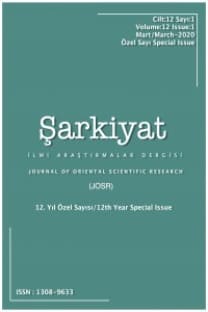MÜSLÜMAN KADINLARIN EŞİTLİK ARAYIŞI: İSLAM HUKUKU VE FEMİNİZM
Eşitlik ve adaletin İslam ve şeriatın temel değerlerinden ve esas prensiplerinden olduğunu Müslüman hukukçular iddia ettiği gibi, Müslümanlar da buna inanır. O halde şeriat kanunları tarafından yönetildiğini iddia eden bir devlette, kadın-erkek haklarını ve toplumsal cinsiyet ilişkilerini düzenleyen kanunlarda, adalet ve eşitlik ilkeleri neden belirgin değildir. Neden, kendini şeriat terimiyle tanımlayan İslam hukuku kitapları, kadınlardan ikinci sınıf vatandaş olarak bahsedip, kadınları erkeklerden aşağıda bir pozisyonda görmektedir.
Anahtar Kelimeler:
İslam Hukuku ve Feminizm:
Muslim Women’s Quest for Equality: Between Islamic Law and Feminism,
___
- 1. AlthoughtheleadingreligiousauthorityinIraq,AyatollahSistani,differsfromtheruling Iranianclericsontheproperroleofreligioningovernment,hisinterpretationsoftheshariaon genderrelationsandfamilylawaremoreconservative,traditional,andpatriarchal.Hisviewsare availableonhiswebsite(www.sistani.org),whichcontainshisrulingsandfatwasonfamilyand genderrelations.Forreportsonrecentdevelopments,seeforinstanceIsobelColemanand MehlaqaSamdani,“PromoteIraqiWomen’sRightswithinanIslamicFramework,”Christian ScienceMonitor,14Oct.2005,p.9;EdmundSanders,“TheConflictinIraq:IslamicSlantin theCharterIsDecried,”LosAngelesTimes,8Aug.2005,p.A1;andColeman,“Women,Islam, andtheNewIraq,”ForeignAffairs85(Jan.–Feb.2006),http://www.foreignaffairs.org/ 20060101faessay85104/isobel-coleman/women-islam-and-the-new-iraq.html 2. Foradiscussion,seeLilaAbu-Lughod,“DoMuslimWomenReallyNeedSaving? AnthropologicalReflectionsonCulturalRelativismandItsOthers,”AmericanAnthropologist194 (Sept.2002):783–90,andRoksanaBahramitsh,“TheWaronTerror,FeministOrientalism,and OrientalistFeminism:CaseStudiesofTwoNorthAmericanBestsellers,”Critique14(2005): 221–35. 3. SeeMir-Hosseini,IslamandGender:TheReligiousDebateinContemporaryIran(Princeton, N.J.,1999),pp.3–6.6. ForadiscussionofconceptionsofjusticeinIslamictexts,seeMajidKhadduri,TheIslamic ConceptionofJustice(Baltimore,1984).Inbrief,therearetwoschoolsoftheologyandthought. ThedominantAsh‘arischoolholdsthatournotionofjusticeiscontingentonreligioustexts; whatevertheysayisjustandnotopentoquestion.TheMu‘tazilischool,ontheotherhand,argues thatthevalueofjusticeexistsindependentofreligioustexts;oursenseanddefinitionofjusticeis shapedbysourcesoutsidereligion,isinnate,andhasarationalbasis.Iadheretothesecond position,asdevelopedbyAbdolkarimSoroush,theIranianreformistphilosopher.Accordingto Soroush,weacceptreligionbecauseitisjust,andanyreligioustextsorlawsthatdefyour contemporarysenseofjusticeoritsdefinitionshouldbereinterpretedinthelightofanethical critiqueoftheirreligiousroots.Inotherwordsreligionandtheinterpretationofreligioustextsare notabovejusticeandethics.Insummer2004,Soroushexpoundedhisargumentinaseriesoffour lecturesatAmir-KabirUniversity,Tehran,entitled“ReligiousSociety,EthicalSociety.”
- Başlangıç: 2009
- Yayıncı: Şarkiyat Araştırmaları Derneği
Sayıdaki Diğer Makaleler
KUR’AN’DA DEĞİŞİM VE DÖNÜŞÜMÜN BELİRLENMİŞ YASAL ADIMLARININ KELÂMÎ YORUMU
İLHAMINI KUR’ÂN’DAN ALAN ŞAİR, MEHMED ÂKİF ERSOY
SEVGİLİNDEN GÜZELLİĞİNİN ZEKÂTINI İSTEMEK
EBÛBEKIR EFENDÎ XWOŞNAV (1814-1880): ‘ALIMEKÎ KURD LI EFRÎQAYA BAŞÛR
M. Zahir ERTEKİN, Bedrettin BAŞUĞUY
“İCTİHÂD” KAVRAMININ CÂFERÎ ÂLİMLERCE KABULÜNÜN TARİHSEL SÜRECİ
CLASSICAL AND MODERNIST APPROACHES TO THE MIRACLES IN THE QUR’AN: A DIACHRONIC REVIEW
DİN, SOSYALLEŞME VE TOPLUMSAL UYUM: SURİYELİ MÜLTECİLER ÖRNEĞİ
